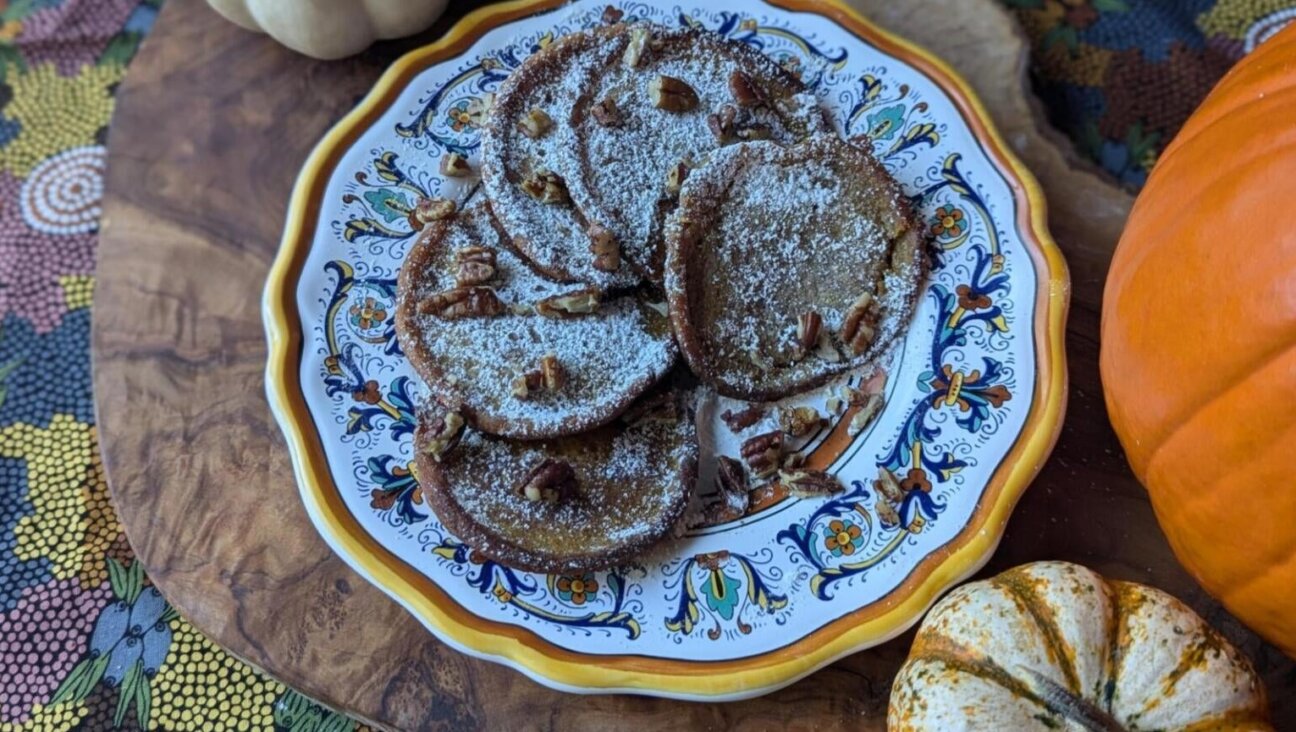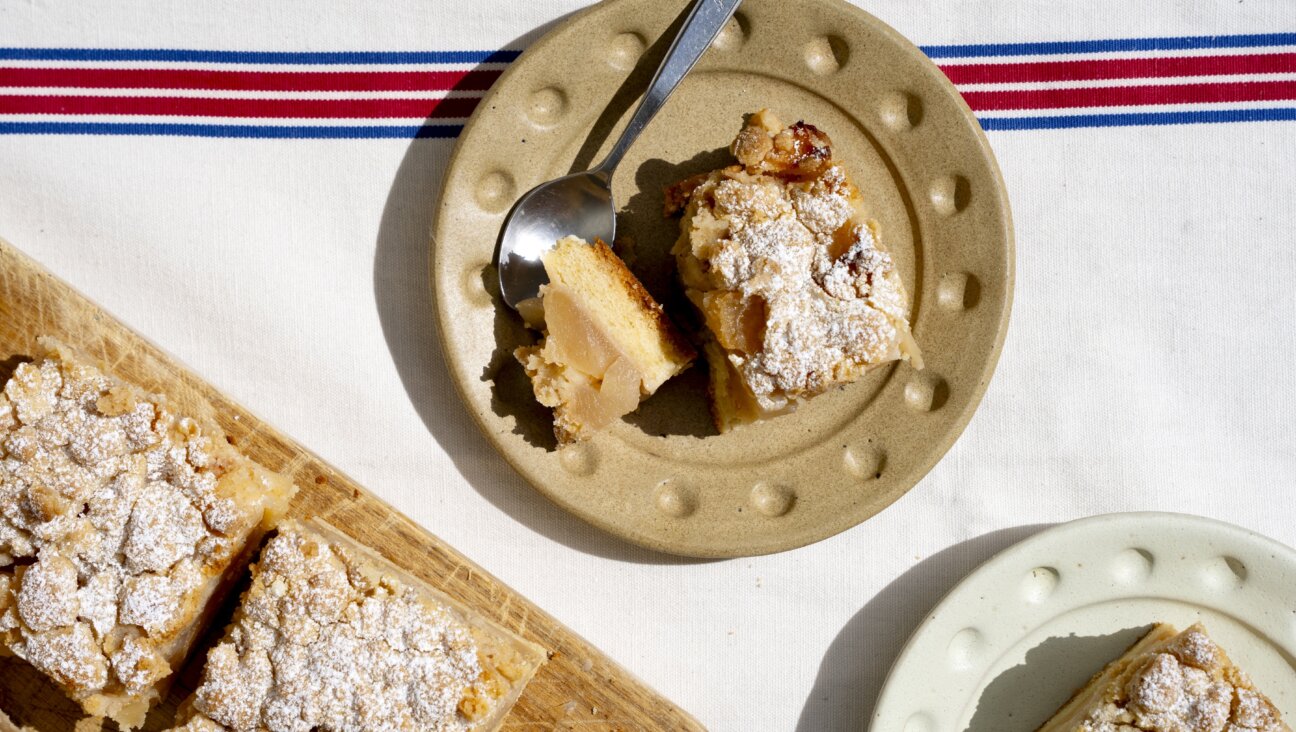A Vegan Cholent for Next Shabbat

Graphic by Angelie Zaslavsky
Photograph by Vered Guttman
Of all the Jewish culinary traditions, Shabbat overnight dishes are the ones that ignite my imagination time and again. From the stories of the communal ovens in Eastern European shtetls, Moroccan villages or Jerusalem’s Old City up to today’s families who keep this tradition going, there’s always something very homey and romantic about it.
And although the many cholent variations, chamin, tbeet, kubaneh and other traditional Shabbat dishes from around the Jewish diaspora are all perfect (as with many tried and tested recipes that existed for centuries), I’m always curious to try new combinations and ingredients and see how overnight cooking affects their texture and flavor.
This time it’s a vegan Shabbat stew, which is really comprised of three different dishes that work well together to make a whole meal: beans and chickpeas with dried sweet peppers; potato, chestnut and dates; and stuffed Swiss chard leaves with rice and tamarind.
The beans and chickpeas become almost creamy when cooked overnight, which comes as no surprise, since it was tried by Northern African and Eastern European Jews for generations. The chestnuts are soft and creamy as well and the potatoes become sweet. The stuffed Swiss chard leaves become sticky almost and full of flavor thanks to the tamarind. Best of all is the nice aroma that fills the house on Shabbat morning.
Vegan Cholent
Dried sweet peppers are available at Eastern European and Latino markets and at some health food supermarkets. You can substitute smoked dried peppers or any other kind of dried peppers. Just be careful not to add too many if they are spicy. Tamarind paste is available at many supermarkets, as well as Indian, Latino and Middle Eastern markets. Roasted chestnuts are available during the winter at health food supermarkets.
Serves 6-8
For the beans and sweet peppers
1 cup dried chickpeas
1 cup cannellini beans
1 cup pinto beans
½ cup olive oil
2 yellow onions, sliced
2 tablespoons light brown sugar
4 dried sweet peppers* (see note above)
4½ teaspoons kosher salt
1 teaspoon ground black pepper
For the stuffed Swiss chard
1½ cups Jasmine rice, soaked in water for one hour
12 large Swiss chard leaves
3 tablespoons tamarind paste
4 teaspoons tomato paste
2 teaspoons kosher salt
4 tablespoons olive oil
For the potato and chestnuts
6 Yukon gold potatoes, peeled and halved
½ lb. roasted chestnuts
½ cup pitted dates
½ teaspoon nutmeg
½ teaspoon ground black pepper
2 teaspoons kosher salt
1) The morning before you plan to serve the cholent soak chickpeas and beans in water in a large bowl. Let stand for 8 hours. Alternatively, you can soak the legumes the night before, but keep the bowl covered in the fridge.
2) Choose a large, preferably wide, pot with a tight lid that can fit in the oven. Start preparing the beans: Put ½ cup olive oil in the pot over medium-high heat and sauté onions until nicely brown. Stir occasionally, and reduce the heat to medium if onions start to brown too quickly. This process should take about 20 minutes. Add sugar and dried peppers and continue to cook for five minutes more. Add beans and chickpeas, salt and pepper, mix well and remove from heat.
3) While the onions are sautéing, start making the stuffed Swiss chard. Bring a small pot of water to boil. Hold each Swiss chard leaf with the stalk as a handle and dip the green part into the boiling water for a few seconds, then transfer to a colander. Wash with cold water. Remove the white stalk and discard.
4) Strain the soaked rice and mix with tamarind, tomato paste, salt and black pepper. Put one chard leaf on a working surface, glossy side down. Put a spoonful or two (depending on its size) of the rice close to the bottom of the leaf, fold sides over rice and roll not too tight over the rice. Arrange on top of the beans in the pot. Continue with the rest of the chard leaves.
5) In a large bowl mix potatoes with chestnuts, dates, nutmeg, black pepper and salt. If your pot is wide enough, arrange potato mixture next to stuffed chard, otherwise arrange potatoes over the stuffed chard.
6) Set oven to 200˚F.
7) Add 5 cups boiling water to pot and bring to boil over medium-high heat. Lower heat and simmer for 10 minutes. Cover pot with lid. If the lid is not very tight, cover the whole pot with two layers of aluminum foil. Transfer to oven and bake overnight.
8) Before serving, remove pot from oven and let sit for 10 minutes.
For more stories, go to Haaretz.com or to subscribe to Haaretz, click here and use the following promotional code for Forward readers: FWD13.
















